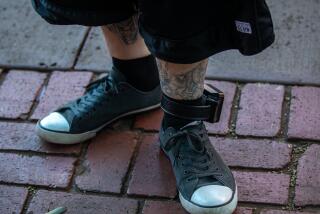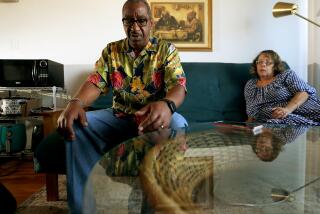Ex-Cons Get Second Chance in Singapore
- Share via
SINGAPORE — David Leow, convicted drug offender, came out of prison fearing he had nothing to look forward to in a country known for its hard-line stance on crime.
But only 17 months after serving his three-year sentence, Leow holds his first legitimate job, earning about $1,257 a month. He owns a car and recently bought an apartment for his wife and the baby they are expecting.
Working at Elite Auto, a car-detailing company, 28-year-old Leow is a model for a state-sponsored campaign to help ex-cons get jobs and feel accepted.
The Yellow Ribbon Project, entering its second year next month, targets employers and the public through ads and media events concentrating on inmates’ vocational abilities.
Named after the song “Tie a Yellow Ribbon ‘Round the Ol’ Oak Tree,” about an ex-convict coming out of prison, Yellow Ribbon augments the work of an existing Singapore prisons service that helps ex-convicts get job matches while doing time.
Every year, 11,000 people are released from the prisons, but in this city-state of 4 million, where law and order are rigorously enforced, ex-cons are obligated to disclose their criminal records to potential employers and are widely stigmatized as violent and untrustworthy.
But that rule eased after passage of a bill two months ago that would exempt minor first-time offenders from having to disclose their record to potential employers once they have been crime-free for five years.
Yellow Ribbon organizers say they haven’t counted how many ex-convicts have found work since the campaign began, but say 120 small- to medium-size enterprises have volunteered to hire them.
For some, it’s also a business strategy. Kevin Lau, who hired Leow and almost 300 others with criminal records, says they are a valuable pool of workers because they’re less likely to think that washing and polishing cars is beneath them.
“A lot of people think this trade is very low-class,” Lau said. “So it’s good this way because the prisons need to put inmates to work and we need people to work for us.”
Lau has also opened a small cafe that employs two ex-offenders.
Singapore’s prison service places inmates on a three- to six-month work program near the completion of their sentences to help them adjust to working life.
Leow, who was imprisoned for possessing and using ketamine, a party drug known as Special K, has been promoted to operations manager.
“Everything I have today I owe to this company and Kevin,” he said, sweating as he vigorously wiped the leather seat of a Volkswagen SUV at the car wash.
“He told me that in order to change my life, I have to change myself,” he said. “Before this I have never worked honestly, and I had nothing. Today, I work hard, but I get what I want.”
More to Read
Sign up for Essential California
The most important California stories and recommendations in your inbox every morning.
You may occasionally receive promotional content from the Los Angeles Times.












